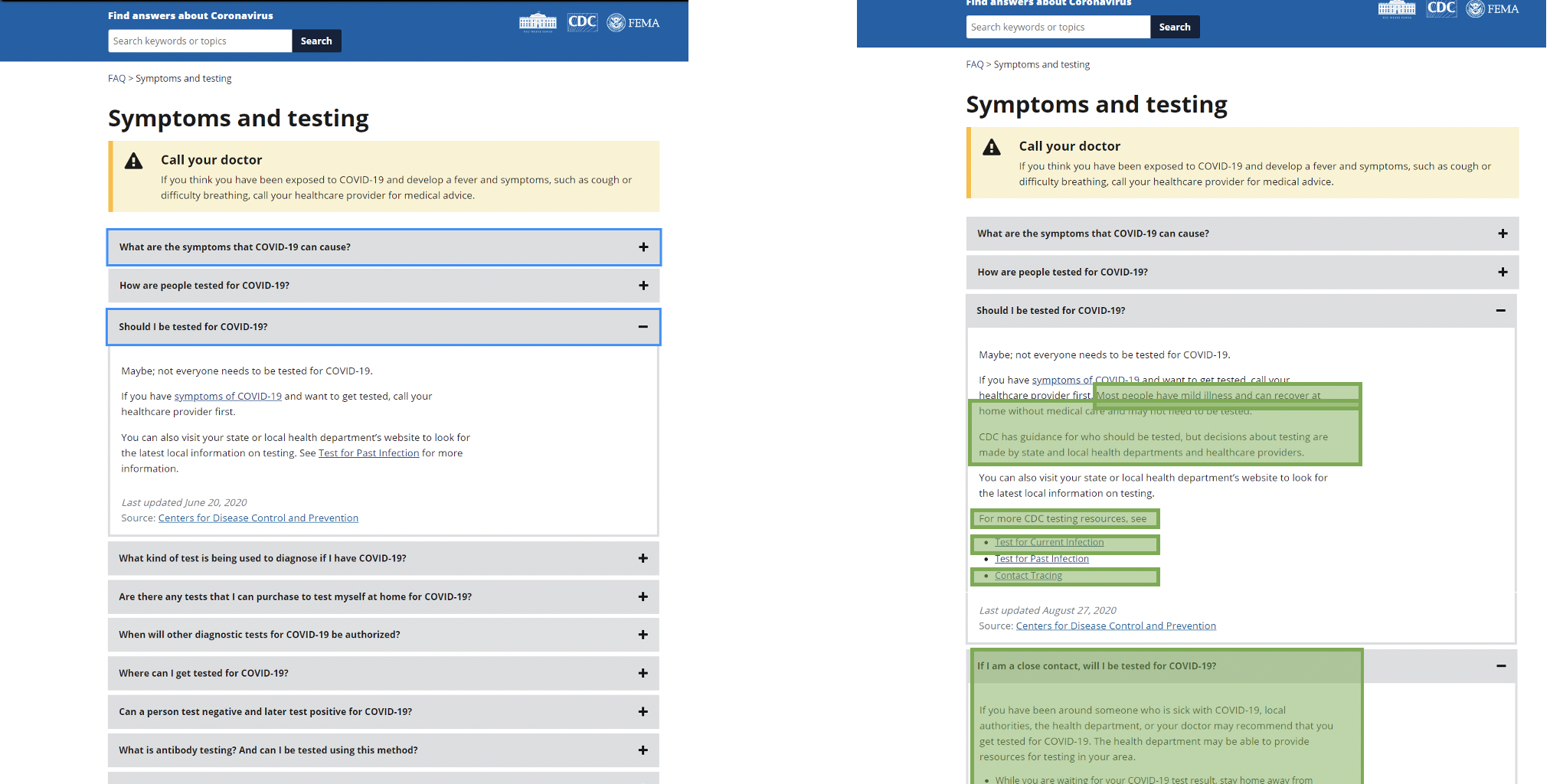Authored by EDGI’s Website Monitoring Team
Welcome! This post is part of the EDGI Website Monitoring Team’s “Change of the Week” blog series. The purpose of this series is to highlight interesting changes we have observed in the language used on, or access to, federal websites. We want to share these changes to encourage public engagement with and discussion of their significance, as well as understanding of the ephemeral nature of website information. This week’s change was made in late August 2020 and features the addition of recommendations regarding whether or not to get tested on the Symptoms and Testing FAQ page of the federal Coronavirus website, created in March 2020 as a collaboration among the White House, CDC, and FEMA (and previously DHHS).

Text highlighted in green was added between August 30, 2020 and September 1, 2020.
What happened? Language was added to the official federal coronavirus website, www.coronavirus.gov, downplaying the need for COVID-19 testing. The official answer for the Frequently Asked Question “Should I be tested for COVID-19?” has always been lackluster. For months it has read “Maybe; not everyone needs to be tested for COVID-19. If you have symptoms of COVID-19 and want to get tested, call your healthcare provider first.” Three weeks ago, text was added stating that “Most people have mild illness and can recover at home without medical care and may not need to be tested. CDC has guidance for who should be tested, but decisions about testing are made by state and local health departments and healthcare providers.”
In addition to these sentences understating the need for testing if you are experiencing COVID-19 symptoms, a new FAQ and answer has been added regarding testing if you’ve been in close contact with someone who has COVID-19. For the new FAQ “If I am a close contact, will I be tested for COVID-19?”, the answer highlights the need for self-isolation but again downplays the need for testing. The new answer begins, “If you have been around someone who is sick with COVID-19, local authorities, the health department, or your doctor may recommend that you get tested for COVID-19. The health department may be able to provide resources for testing in your area.” The rest of the answer assumes that you have gotten tested, and recommends 14-day quarantines regardless of test results. However, the last clause of the answer is peculiar. Rather than recommending re-testing if you experience symptoms but have a negative test result, the answer says, “If your test is negative and you have symptoms, you should continue to self-quarantine away from others for 14 days after your last exposure to COVID-19 and follow all recommendations from the health department. Additional medical consultation and a second test may be needed if your symptoms do not improve.”
Why we think it is interesting: It is common knowledge at this point that testing is critical to identifying and containing outbreaks of COVID-19, which has infected 7,000,000 people and claimed 200,000 lives in the U.S. However, President Trump has repeatedly blamed the high number of cases in the U.S. on testing “too much,” and has recommended a significant narrowing of the U.S.’ approach to testing. The sentences added to the federal government’s official coronavirus website (which indicates it is a collaboration between the White House, CDC, and FEMA) explicitly state that people who are experiencing COVID-19 symptoms may not need to get tested, which serves the political agenda to minimize testing and under-count COVID-19 cases.
A similar devaluing and downplaying of testing was made in late August, when the CDC updated its guidelines regarding testing after one has been in close contact with someone who has COVID-19. The guidelines were changed from a concrete recommendation to get tested for COVID-19 after exposure to an individual infected with it, to stating “You do not necessarily need a test unless you are a vulnerable individual or your health care provider or State or local public health officials recommend you take one.” The lack of a recommendation to get tested following exposure to a person infected with COVID-19 would almost assuredly result in an under-counting of COVID-19 cases. In addition to under-counting persons who fall ill with “mild” cases of COVID-19, it would also under-count asymptomatic infected persons. It is estimated that almost half of people with coronavirus infections are asymptomatic, and there is significant viral transmission by these asymptomatic people, in part due to a lower likelihood of self-isolation than persons who become ill. The updated guidance suggesting that only particularly vulnerable people need to be tested after exposure to COVID-19 has perplexed health care professionals. Some civil servants at the CDC have said that the changes were made due to political pressure.

